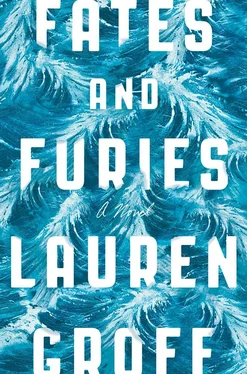“What are you doing in your pajamas?” Lotto said.
“The question is, my dear, what you are doing here.” He sat next to Lotto, then said, with a sideways grin, “Or were you looking for me?”
“No,” Lotto said.
“Oh,” Denton said.
“But here you are,” Lotto said.
When there was no more joint to smoke, Denton said, “Saving my pennies. Crashing in the costume room. I’m resigned to a destitute old age. It’s not the worst. No bedbugs. And I like the constant bells.”
On cue, the three-thirty bell chimed, and they laughed.
Lotto said, “Tonight I found a boy who hanged himself. Hung himself. Hanged himself.”
Denton went still. “Oh, child,” he said.
“I didn’t really know him. They called him Jelly Roll.”
“Harold,” Denton said. “That boy. I tried to get him to talk to me, but he was so sad. You boys were terrible. Savages. Oh, not you, Lotto. I never meant you. I’m so sorry you had to be the one to find him.”
Lotto’s throat filled with something, and he saw himself swinging from the scull until the door opened, the light flicked on. It came over him that even had he crept up the stairs and found the dean’s office unlocked and opened the drawer and felt the weight of the gun in his hand, something in him would have resisted. It would never have ended that way. [True. It was not his time.]
Denton Thrasher gathered Lotto in his arms and wiped his face with the hem of his pajama top, revealing a furry white belly, and Lotto was rocked on the edge of the stage, smelling witch hazel and Listerine and pajamas worn too many times between washes.
—
THIS LANCELOT CHILD in Denton’s lap. So young, crying past the point of immediate sorrow into something deeper. It frightened Denton. Four o’clock. Sweet Lancelot, so talented, but this was a little much, even if Denton saw in him the rare spark. His looks were both promising and as if some essential promise had fled and left wreckage in its wake, which was odd, the boy being fifteen at most. Well, beauty could come back, perhaps. In ten years he might be ravishing, grow into his great goofy body, into his charm: already, there was the bigness of a real actor on the stage. Alas, Denton knew, the world was full of real actors. Christ, the bells of four-thirty, he was about to go out of his skull. Denton could not hold this sorrow. He was too weak. [Grief is for the strong, who use it as fuel for burning.] He thought, I’ll be stuck here with this boy forever. He knew only one thing that could shut off this flow of tears, and in a panic, he pushed the child upright and scrabbled in his lap and took the surprised pale worm out of his jeans, and it grew impressively in his mouth, thank god, and this alone was enough to stop the sobs. Baton of youth! Youthfully swift, too. O, that this too too solid flesh was now melting, thawing, resolving itself into a spunky dew. Denton Thrasher wiped his mouth and sat up. What had he done? The boy’s eyes vanished in shadow: “Going to bed,” he whispered, and he ran down the aisles, through the doors, out. A shame, Denton thought. Dramatic, to be forced to flee in the night. He would miss this place. He would regret not watching Lancelot grow. He stood and took a bow. “Be blessed,” he said to the great empty theater and went off to the costume room to pack.
—
SAMUEL HARRIS, up early for crew, was watching out the window when he saw poor Bumblefuck Pie run across the dark quad, weeping. Ever since the other boy had arrived halfway through the fall semester, he’d been so blue he was almost iridescent with sadness. Samuel was the cox of Bumblefuck’s boat, practically nestled every day in his lap, and despite the fact that the other kid was kind of a pariah, Samuel worried about him, six-foot-three and only a hundred fifty pounds, frozen-looking, cheeks like slabs of beaten tenderloin. It seemed clear he was going to hurt himself. When Samuel heard Lotto rushing up the stairs, he opened his door and manhandled him into the room, fed him oatmeal cookies that his mother sent from home, and this way got the whole story. Oh god, Jelly Roll! Lotto said that after the police came, he’d sat in the theater for hours to calm down. He seemed to want to say something more, considered it, packed it away. Samuel wondered. He thought of what his father the senator would do, and drew a man’s stern face over his own. He reached out a hand to Lotto’s shoulder and patted him until he calmed. It felt as if they’d crossed a bridge a second before it collapsed.
For a month, Samuel watched Lotto drag himself around the campus. And when school let out, Samuel took the other boy with him to his summerhouse in Maine. There, with the senator father and Samuel’s whippet mother, star debutante of Atlanta’s highest black society, Lotto experienced sailboats and clambakes and friends in Lilly Pulitzer and Brooks Brothers knitwear, champagne, pies cooling on the windowsill, Labrador retrievers. Samuel’s mother bought him facial soap and good clothes, made him eat and stand tall. He grew into himself. He found success with a forty-year-old cousin of Samuel’s who cornered him in the boathouse; brown skin tasted the same as pinkish, Lotto learned to his delight. When they returned to school for sophomore year, Lotto had tanned so golden it was easy to overlook the zit scars on his cheeks. He was blonder, looser. He smiled, made jokes, learned to expand himself on the stage and off. By never swearing, he showed his cool. Near Christmas, Samuel’s friend had become more popular than even Samuel was, he of the dust-devil confidence, of the shining great brown eyes, but it was too late to mind. Every time Samuel looked at his friend, all those many years of their friendship, he would see how he himself was a miracle worker, how he had brought Lotto back to life again.
—
THEN, just before Thanksgiving of sophomore year, Lotto, coming back to his room after math study one day, found Chollie, waxy and smelly, slumped in the hallway outside his door. “Gwennie,” Chollie said, and groaned, folded himself in half. Lotto dragged him into the room. He got a garbled story; Gwennie had overdosed. She couldn’t have died, dangerous Gwennie, vibrating with life. But she had. Chollie had found her. He’d run away. He had nowhere to go but to Lotto. The beige linoleum floor turned into the ocean, crashed and crashed against Lotto’s shins. He sat down. How swiftly things spun. Two minutes ago, he’d been a kid, thinking about his Nintendo system, worried about asymptotes and sines. Now he was heavy, adult. Later, when the boys had calmed and they went for pizza in the little town, Lotto said to Chollie what he’d wanted to say to Gwennie since the night of the fire: “I’ll take care of you.” He felt brave. Lotto let Chollie sleep in his bed for the rest of the term; he didn’t mind the floor. [Through the rest of Lotto’s high school, through college, Chollie would take the money Lotto would give him gladly, go out into the world, eventually return. He sat in on every class he could; he had no degrees, but he learned more than enough. If people didn’t report Lotto, it was because they loved Lotto, not because they cared a whit about Chollie, who was a person only Lotto could stand.]
The world was precarious, Lotto had learned. People could be subtracted from it with swift bad math. If one might die at any moment, one must live!
Thus began the era of women. Trips to the city, sweating through polo shirts at the nightclubs, lines of coke on midcentury-modern coffee tables, parents out of town. It’s okay, man, don’t freak, the housekeeper doesn’t care. Threeway with two girls in someone’s bathroom. “Maybe you could come home this summer,” Antoinette said. “Oh, now you want me,” Lotto said sarcastically, refusing. Headmaster’s daughter on the lacrosse field. Hickeys. Maine again, forty-one-year-old cousin at a seedy motel, neighbor girl in a hammock, tourist girl swimming out to the sailboat at night. Samuel rolling his eyes with envy. Volvo station wagon bought with Lotto’s fat allowance. Three inches by September, six-foot-six. Othello in eponymous same, and a Desdemona from town, seventeen, shaved down there like a prepube, Lotto discovered. Spring; summer in Maine; autumn, Head of the Charles, the varsity eight placed. Thanksgiving at Samuel’s New York house. Christmas, Sallie took him and Rachel to Montreal. “No Muvva?” he said, trying not to show his hurt. Sallie blushed. “She’s ashamed of the way she looks,” she said gently. “She’s fat now, hushpuppy. She never leaves the house.” Early admission to Vassar, the only school he applied to, overconfident; an excellent party there, a party to end all parties, no reason for his choice but that. Celebration with Samuel’s fifteen-year-old sister up for the weekend, in a handicapped bathroom. Never, never tell Samuel. Searing glare. What am I, an idiot? Surprise! Samuel was going to Vassar, too, had gotten in everywhere but would have died before he missed Lotto’s fun. Only skinny Sallie and four-year-old Rachel, who wouldn’t let him put her down, came up for his graduation. No Muvva. To offset the sadness, Lotto imagined his mother as the mermaid she’d once been, not the obese woman who’d swallowed her. In Maine, Samuel’s forty-three-year-old cousin in Switzerland, alas. Samuel’s sister in an orange bikini, with a mop-haired boyfriend mooning behind her, thank god. Only one girl that whole summer, adder-tongued ballerina: what she could do with her legs! Games of croquet. Fireworks. Keg on the beach. Sailing regatta.
Читать дальше












